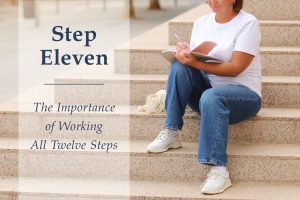Dietitian H. Theresa Wright, MS, RD, LDN, explains how coming to understand problems with food as an addictive process improved the program and peer support based care she was already giving. Discovering Overeaters Anonymous, and learning about OA’s Plan of Eating Tool, confirmed previous success in her practice and gave her a new and stronger way to provide care to her clients.
Get Overeaters Anonymous, Third Edition as an mp3, audiobook, or compact disc.
Transcript:
I’ve been in practice as a registered dietitian for thirty-three years. I first became interested in obesity and weight management when I began my master’s program; I wrote my thesis on the factors that influence success in weight loss programs. I found that success required a strong program of recovery and a special, supportive friend. I did not realize I was describing Overeaters Anonymous until years afterward.
I worked for years in hospitals and weight loss programs. What I learned in my training worked well for some people but not at all for others. When I heard the concept of food as part of an addictive process, I knew immediately it was the key I had been seeking.
I believe that people can be addicted to food, and it’s important for them to identify and remove from their lives the foods and food elements to which they are sensitive. These are called trigger or binge foods: they give people cravings, obsessions, or the inability to stop. Any food can be appropriate in an abstinent food plan, but if a food causes problems for the person, it needs to be removed. Then the food addict is free to use the Twelve Steps to create the life he or she really wants to live.
Often, people have struggled with their obsessions for their whole lives, or since they were very young. Whether they are overweight, normal weight, or underweight, they are all in pain about their relationship with food and eating.
Abusive and compulsive eating have many names and take on many forms: anorexia, bulimia, compulsive overeating, compulsive undereating, abusive restricting, binge-eating disorder, and food addiction. People can move from one form to another. All of these eating disorders have physical, mental, emotional, and spiritual components. I believe that some people have a genetically inherited component; many have parents and siblings or other family members who demonstrate similar problems or related addictions. I’ve observed that Overeaters Anonymous and its Twelve Step program
of recovery provide an effective and compassionate solution for all of these problems. The men and women in OA, who are recovering from their own eating problems, reach out in love to help each other with suggestions, support, and strategies.
This Twelve Step program is spiritual, and it is also a program of action and transformation. It offers the opportunity for relief from obsessive thoughts and abusive behaviors. It offers practical suggestions and people to support the individual’s effort to heal and recover.
Physicians, dietitians, therapists, and a variety of other health care professionals have much to offer. But the OA connection gives compulsive eaters the daily support and wisdom they need to follow through consistently on the professional medical recommendations. A sponsor helps his or her sponsee follow the suggestions given; other members listen and offer strategies, support, and a friendly ear. This network of professional and nonprofessional people, and a great deal of compassion and understanding, can empower recovery from eating disorders. I have observed that only those who have learned to effectively use the support of Overeaters Anonymous are able to enjoy long-term recovery and sanity.
Many OA members use an individualized food plan, which is a tool designed to help them know what and when to eat. It is a flexible, usable worksheet that assists with maintaining abstinence from compulsive eating and compulsive food behaviors; it is not a straitjacket or an unreachable goal or standard. An individualized food plan meets the body’s nutrient needs, helps to handle medical issues, and meets weight and recovery goals. A food plan should accommodate each person’s schedule, food preferences, taste buds, ethnicity, and the reality of life. The food plan should fit the member like a comfortable pair of sneakers. It should be solid, supportive and comfortable enough to help the member travel over the rocky ground of his or her recovery.
It is very important to meet the body’s nutrient needs. The body needs the physical support of the nutrients that repair, replace, and maintain its structure and systems. Often, compulsive eaters have used so many restrictive diets in the past that their nutrient needs have not been met for a long time, and the body struggles just to make it through the day—with never enough nutrition.
As part of their plan of eating, some OA members may choose to weigh and measure their food. This can be useful in changing the balance of calories and nutrients in such a way that cravings are diminished and the body has enough to rebuild itself. Achieving the right balance of nutrients is essential for weight loss and maintenance. After years of eating inappropriate amounts of foods, people often have no idea of what the right amount is. It takes time for people to learn to notice when they are hungry, full, or overfull, and then to adjust their food plan appropriately.
Maintaining a healthy weight over the long-term is often harder than losing the weight initially. Once they reach a healthy body size, people must increase their food intake to stop the weight loss, and that can be scary. The joy and delight of losing weight is gone, and the effort of struggling with food, eating, and body weight is gone. The Twelve Step process teaches the individual a different way of living—a way to create a joyful and useful life without the food obsession. This process must be continued long-term.
Cravings and difficult food situations will continue off and on throughout recovery. This is normal; recovering people need to learn how to handle these issues. They need to plan for times in which they will be confronted with large volumes of food, binge or trigger foods, or difficult food situations. OA provides a range of tools to handle these situations.
Over my years of practice, I have been deeply grateful for the support that members of Overeaters Anonymous have given to my clients. In OA, members have the freedom to create the lives they have dreamed of. They learn how to use the tools and strategies of recovery, and they experience love and support in all of life’s challenges.
Nowhere else can people find this kind of training and support, especially not for the simple “fee” of passing it on and helping another member. I wish OA and its members long-term growth and peaceful, joyful recovery.
— H. Theresa Wright, MS, RD, LDN, 2013
H. Theresa Wright, a dietitian specializing in addictive and compulsive eating disorders, runs a nutrition center in Pennsylvania. She has helped to carry the OA message in her work with clients and in interviews for an OA Internet radio series. In addition, she reviewed the food plans described in the OA pamphlet Dignity of Choice.
Overeaters Anonymous, Third Edition pp. 191–194.
© 1980, 2001, 2014 by Overeaters Anonymous, Inc. All rights reserved.





